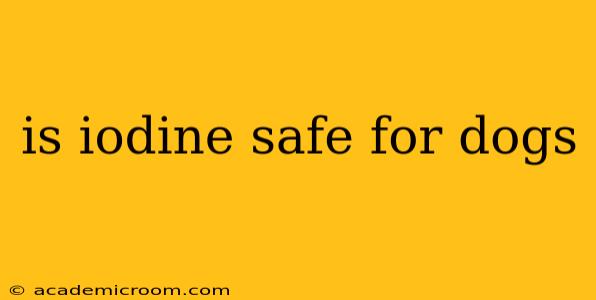Iodine, a crucial element for human health, plays a vital role in thyroid hormone production. However, its safety for dogs is a different story. While trace amounts are necessary, excessive iodine can be incredibly toxic to canine companions. This guide delves into the complexities of iodine and its impact on dogs, answering common questions and dispelling myths.
What is Iodine, and Why is it Important?
Iodine is a mineral essential for the proper functioning of the thyroid gland in both humans and animals. The thyroid gland utilizes iodine to produce hormones that regulate metabolism, growth, and development. A deficiency can lead to hypothyroidism, characterized by lethargy, weight gain, and a dull coat. However, the delicate balance is key – too much iodine is just as problematic as too little.
Is Iodine Toxic to Dogs?
Yes, iodine can be toxic to dogs. The toxicity arises from an excess intake. While a tiny amount is needed for thyroid function, large doses can cause hyperthyroidism, leading to a range of symptoms. The severity of the toxicity depends on several factors, including the amount ingested, the dog's size, and pre-existing health conditions. It's crucial to understand that even seemingly harmless sources of iodine can pose a risk if ingested in significant quantities.
What are the Symptoms of Iodine Toxicity in Dogs?
Symptoms of iodine toxicity in dogs can vary depending on the severity of the poisoning. Mild cases might show subtle signs, while severe cases can be life-threatening. Watch out for:
- Vomiting: A common symptom of ingestion of toxic substances.
- Diarrhea: Often accompanied by vomiting, indicating gastrointestinal distress.
- Lethargy: A decrease in energy and activity levels.
- Excessive salivation: Producing more saliva than usual.
- Loss of appetite: Refusal to eat or a decrease in food intake.
- Tremors: Involuntary shaking or trembling of the body.
- Seizures: In severe cases, iodine poisoning can lead to seizures.
- Respiratory distress: Difficulty breathing.
If you suspect your dog has ingested a large amount of iodine, seek immediate veterinary attention.
What are Common Sources of Iodine for Dogs?
Many household items can contain iodine, some in relatively harmless amounts while others pose a greater risk:
- Some disinfectants: Certain cleaning solutions may contain iodine compounds.
- Iodine-based medications: Human medications should never be given to dogs without explicit veterinary guidance.
- Certain algae: Some types of algae can accumulate high levels of iodine.
- Iodized salt: While small amounts in dog food are typically fine, excessive amounts can be problematic.
What Should I Do if My Dog Ingests Iodine?
Immediate action is crucial if you suspect your dog has ingested a significant amount of iodine. Do not induce vomiting at home unless instructed by a veterinarian. Instead:
- Contact your veterinarian or an animal poison control center immediately.
- Provide them with details: The type of iodine product, the amount ingested (if known), and your dog's weight and breed.
- Follow their instructions carefully. They may advise you to bring your dog in for examination and treatment.
Can I Give My Dog Iodine Supplements?
Absolutely not without explicit veterinary guidance. Never administer iodine supplements to your dog unless specifically prescribed by a veterinarian. Self-treating can be incredibly dangerous and lead to severe health complications. Your vet will assess your dog's needs and determine if iodine supplementation is necessary and, if so, the appropriate dosage.
How Can I Prevent Iodine Toxicity in My Dog?
Prevention is key. Take these precautions:
- Keep iodine-containing products out of reach: Secure cleaning supplies and medications in cabinets or areas inaccessible to your pet.
- Be mindful of your dog's diet: Ensure that your dog's food does not contain excessive amounts of iodized salt.
- Choose pet-safe cleaning products: Opt for cleaning solutions that do not contain iodine.
By understanding the potential dangers of iodine and taking preventative measures, you can help ensure the safety and well-being of your canine companion. Remember, when in doubt, always consult with your veterinarian. They can provide personalized advice and guidance based on your dog's specific needs and health history.
